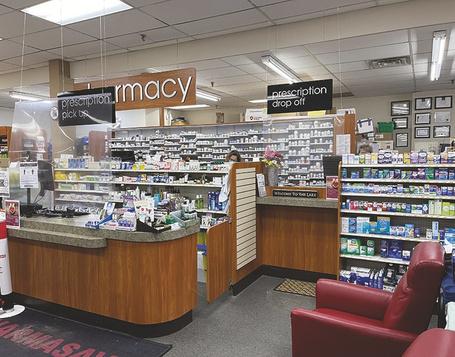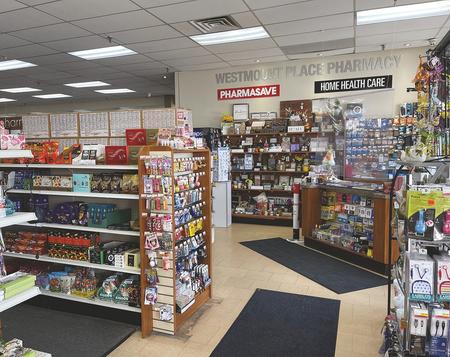
4 minute read
Hospitals Need More Provincial Support to Reduce Capacity Pressures
There's no sugarcoating the fact that the past few years have been challenging for health care. Lingering impacts from the global pandemic and a significant shortage of health workers continue to be felt across the system.
But with our community's strong support, Waterloo Region has much to be proud of on the health care front.
Last spring Grand River Hospital and St. Mary’s General Hospital secured a $5 million planning grant from the provincial government to continue planning for a new joint hospital and modernize some existing hospital facilities in Kitchener-Waterloo. The community can learn more about our vision for new and renewed hospital infrastructure at futureofcaretogether.ca. We couldn’t have achieved this significant milestone without the backing of our business community and grassroots support across our region.
As we push ahead with detailed planning for the project in partnership with the Ministry of Health, we must build on that momentum and keep the project high on the provincial government’s priority list. Over the coming months, we will need your ongoing support as we continue to engage our provincial partners on why it’s critical to quickly deliver on this project and create a new world-class hospital for Waterloo Region.
While we work towards future hospital facilities, we must also implement immediate solutions to address current challenges facing our hospitals and the overall health care system.
Grand River Hospital and St. Mary’s General Hospital are working closely together and with system partners, such as Cambridge Memorial Hospital, to minimize the impact of escalating capacity challenges on the patients, families, our teams and communities we serve.
But now that Ontario and the federal government have reached an agreement for a baseline funding increase through the Canada Health Transfers, we are hopeful the provincial government will provide additional funding support to enable us to expand and improve care delivery to meet growing demand.
Hospitals across Waterloo Region are doing everything in our power to provide timely, quality care as the number of patients we serve has risen to record levels in recent months.
Three years after the onset of the COVID-19 pandemic, the virus continues to circulate, but it is no longer the main reason we’re experiencing high patient volumes and challenges delivering the care people need. We’re feeling the impact of a broader mix of issues, most of which were already beginning to squeeze our capacity even before the pandemic.
The main contributing factors include rapid population growth in our community, delayed care during the pandemic, shrinking capacity in community and home care, aging hospitals in Kitchener-Waterloo that are too small and outdated for our growing community, a severe nation-wide shortage of health workers, and a pressing need for increased levels of operating funds from governments to keep pace with population growth, inflation and cost of care increases due to Covid-driven changes.
Our region’s growing and aging population is driving a significant portion of the higher number of patients coming through our doors. Waterloo Region is one of the fastest-growing urban areas in the country. Our population is projected to keep climbing –jumping by 45% over the next 20 years.
Over the same timeframe, the number of residents older than 75 in Kitchener-Waterloo is expected to grow by nearly 170%. Individuals in this age group are more likely to require hospital care and health care services as they age, increasing demand on our resources. Insufficient health care capacity elsewhere in the community, such as long-term care, home care and primary care, cause even more patients to rely on hospitals for services.
As demand escalates, our aging hospitals are increasingly being stretched to their physical limits. We’ve significantly outgrown our sites, which were built between 50 and 100 years ago when our community was much smaller. The staff, physicians and volunteers at our hospitals provide excellent patient care, but our outdated, overcrowded hospitals are making their jobs more difficult.
Like hospitals elsewhere in Ontario and across Canada, we are navigating a chronic shortage of health professionals that has significantly worsened throughout the pandemic. The depleted pool of doctors, nurses and other health workers makes it challenging to fill vacant positions and leaves fewer hands available to care for more patients.
Hospitals across Ontario face significant financial pressures tied to caring for our growing and aging population. In addition to increasing labour costs and the ongoing financial impacts of COVID-19, the rising rate of inflation has significantly increased our operational expenses for food, energy, medication, supplies and equipment.
We are grateful to Ontario’s government for providing additional funding on a temporary or one-time basis over the past three years to respond to the pandemic, including investments to hire more health workers and increase bed capacity to care for more patients.
We are encouraging the provincial government, with financial support from the federal government, to make these temporary investments, permanent in its upcoming spring budget to help stabilize the health care system and to also invest in increasing current capacity to ensure patients are able to access more timely care. We are also seeking the government’s continued support of the St. Mary’s General Hospital and Grand River Hospital joint redevelopment project in the upcoming budget.
Grand River Hospital and St. Mary’s Hospital continue to work with our health system partners, such as the KW4 Ontario Health Team, on initiatives to help high-needs populations get the care they need in community settings, when and where they need it.
ABOUT THE AUTHOR Mark Fam
Mark Fam is the President of St. Mary’s General Hospital, home of the Regional Cardiac, Chest and Eye Programs. A Certified Health Executive, Mark has a broad base of industry knowledge based on his 20+ years working in the health system. Mark also contributes to new learners in the health system through his work as an Assistant Professor with the Institute for Health Policy, Management and Evaluation, and Associate Professor at the Rotman School of Management at the University of Toronto.
We expect high patient volumes and increased demand for hospital care to continue to create capacity challenges for our hospitals in the months ahead. People in need of non-urgent care can help by accessing alternate care services in the community, such as walk-in clinics and primary care providers. As always, we recommend that you protect yourself and others by getting vaccinated, wearing a mask in high risk settings, washing your hands frequently, and staying home if you don’t feel well.
Rest assured, if you need emergency care, we are here for you.
We recognize that lengthy waits can be frustrating. Our team members continue to give their all to provide quality care to our community under extremely challenging circumstances. Please remember to treat hospital staff, volunteers and others at our sites with respect at all times. We thank all members of our community for your ongoing patience and understanding.
ABOUT THE AUTHOR Ron Gagnon
Ron Gagnon is the CEO and President of Grand River Hospital. Ron is a seasoned executive with over 25 years of senior leadership experience including 16 years as a hospital President and CEO. He joined Grand River Hospital in November 2018 as its President & CEO.








